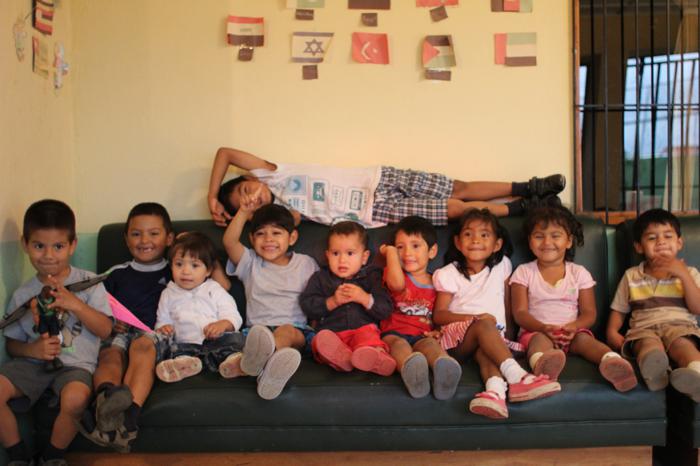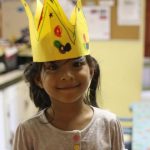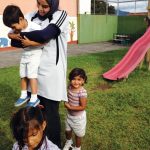By Fatmah H. Al-Qadfan
Just as the city was stirring to life, I would make my way into the crowded San Pedro. I walked the same long route every day from my host family’s residence in Santa Marta to my volunteer placement on the other side of town. To this day I don’t know the exact location of the orphanage where I worked, as there are no formal street addresses in Costa Rica. I knew where to cross the street and where to leap over an open sewer; I knew that it was 15 meters after the post office, downhill and to the left. I memorized the bakeries and fruit stands along the way. I knew where to walk faster and where I could linger – even take my camera out to capture the heavy clouds looming over the mountains in the distance.
I never encountered any hostility in Costa Rica, but I was always apprehensive on my walk to and from the orphanage. Maybe it was the unfamiliar terrain and the shadowy, slippery streets lined with small houses. I found comfort in the constant flow of traffic and reassurance in the random nod from an old man or the smile of a young mother pushing a wobbly stroller. I tried to own my walk and enjoy it. I may have looked extremely different in my loose trousers, long shirt and hijab – but in San Pedro, nobody seemed to care. Nonetheless, years of being on guard while traveling abroad meant that I was quick and careful, never allowing myself to fully relax.
When I approached the orphanage, my nervousness would dwindle away. The last stretch of my walk was an emotional turmoil for me. I would stop thinking about myself and focus on the children instead, the ten little ones who waited in the shelter behind the thick iron bars. Standing outside the gate waiting for one of the tías (aunties) to open the door for me, all my tension would vanish. In its place a warm glow would spread through my body; it was maternal warmth that the children needed. These sweet kids relied on the kindness of strangers, and that notion overwhelmed me.
Stepping into the orphanage, I’d see the young faces peering up at me. One little girl, headstrong and mischievous, always greeted me with an impish smile. She sometimes held her arms up, testing me. Would I carry her under the watchful eyes of the tías? I learnt how to give her a quick hug, holding on for a few brief seconds and treating all the children equally. The rest of the children were usually testy on my arrival and I would try to read their body language to see what new cliques they had formed overnight and what alliances were broken. Three or four of them would watch me with big eyes and bigger pouts. Every day they dared me to be their friend and every day, I rose to the challenge.
My first day at the orphanage was the best. The children were in a particularly good mood. The sun shone brightly, the sky was clear and their little hands showed evidence of a chocolaty snack. We ran around in the garden and tackled each other to the ground. I was engulfed by the noise, the colors and the unfamiliar Spanish being shouted by the children. I couldn’t understand a word but I was bursting with joy because they seemed to like me! There was nothing I wanted more in the world that day than their acceptance.
During our first session, one of the organizers sat the children down and pointed to my hijab. He spoke to the children slowly and I saw their eyes widen with curiosity. Up until that moment, they had not even noticed that I looked different. One of the older boys interrupted with a question. I saw the organizer point up to the sky and I can only assume he was explaining my religious beliefs in simple terms for these youngsters. I was listening to his comforting tone when – without warning – everybody moved at once and the children threw themselves in my arms for a group hug. Within the walls of the orphanage, appearances did not matter. What mattered was providing each other with love and strength.
I basked in that tolerance throughout my time in Costa Rica. I did not let my nonexistent Spanish get in the way and I proactively planned lessons, held contests and surprised the children with fresh strawberries. After every productive afternoon I’d walk away in satisfaction, knowing that I gave those children my undivided attention. Drenched in sweat and covered in grass stains (or worse!), I’d make my way up the hill to the post office, past the now empty fruit stand and join the evening traffic on the main road. Happy and hungry, I’d head back to a nameless side street in Santa Marta where I knew my host mother was waiting for me with a kind smile and a hot dinner.









